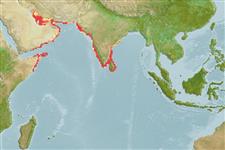分類 / Names
俗名 | 同種異名 | Catalog of Fishes(屬, 種) | ITIS | CoL | WoRMS | Cloffa
Elasmobranchii
板鰓亞綱 (鯊魚與魟魚) (sharks and rays) >
Carcharhiniformes (Ground sharks)
真鯊目 (Ground sharks) >
Carcharhinidae (Requiem sharks)
白眼鮫科 (Requiem sharks)
Etymology: Carcharhinus: karcharos (Gr.), sharp or jagged; rhinus, an ancient name for sharks, from rhine (Gr.), rasp, both words alluding to a shark's jagged, rasp-like skin (See ETYFish); dussumieri: In honor of Jean-Jacques Dussumier (1792-1883), French voyager and merchant, who collected some of the type material off Bombay (Mumbai) [authorship often attributed to Müller & Henle, who published Valenciennes’ description] (See ETYFish).
Eponymy: Jean-Jacques Dussumier (1792–1883) was a French merchant, collector, traveller and ship owner. [...] (Ref. 128868), visit book page.
Environment: milieu / climate zone / depth range / distribution range
生態學
海洋 礁區魚類; 深度上下限 0 - 100 m (Ref. 106604). 熱帶; 30°N - 5°N, 49°E - 84°E
Indian Ocean: from at least the Persian Gulf to India. Complete distributional range is unknown.
印度-西太平洋: 波斯灣與阿拉伯海在阿曼灣之間而且巴基斯坦向東至印尼爪哇與阿拉弗拉海;(參考文獻 9819) 日本向南至澳洲.(參考文獻 6871)
Length at first maturity / 大小 / 重量 / 年齡
Maturity: Lm 68.3, range 60 - 75 cm
Max length : 121 cm TL 雄魚/尚未辨別雌雄; (Ref. 114871)
脊椎骨: 113 - 129. This small species is distinguished by the following characters: snout relatively long and narrowly rounded to almost pointed; upper anterior teeth are oblique and blade-like, coarsely serrated, with lateral margin deeply notched and with several large and serrated basal cusplets; lower anterior teeth are narrower, slightly oblique, lateral margins notched and usually without large basal serrae, finely serrated; total tooth row counts 27-29/24-30, or 52-59; interdorsal space often without a ridge, 17.9-20.8% TL; first dorsal fin relatively low and not falcate, origin over middle of pectoral-fin inner margin, length 14.3-16.2% TL, 1.4-1.6 times height, inner margin 2.2-2.5 in base; second dorsal fin is much smaller, broadly triangular, height 32-37% of first dorsal-fin height, origin about opposite anal fin origin; anal fin is slightly falcate, height 1.0-1.2 times second dorsal-fin height, base 0.9-1.1 times second dorsal fin base; body colour pale brownish dorsally, whitish ventrally; second dorsal fin with a black blotch on upper third of fin, not extending onto upper surface of body and very well defined from ground colour, while other fins mostly plain; total vertebral counts 123-138; monospondylous precaudal counts 42-48; diplospondylous precaudal counts 20; diplospondylous caudal counts 59-70; precaudal counts 62-68 (Ref. 89954).
背面淺灰色或灰褐色, 腹面微白色的; 在第二個背鰭上的一個黑色的斑點.(參考文獻 9997)
A common but little-known shark found on the continental and insular inshore areas (Ref. 9997). Feeds mainly on fishes but also on cephalopods, and crustaceans (Ref. 6871). Viviparous (Ref. 50449), with a yolk-sac placenta; gives birth to litters of 1-4 (usually 2) pups (Ref. 58048). Pregnant females (79-100.7 cm TL) that were caught contained 2-5 late-term embryos between 32-38.7 cm TL, thus birth size is presumed to be around 37-39 cm TL. From more than 1000 market specimens (in Kuwait, Qatar and Abu Dhabi), size of males and females range from 36-85 cm TL and 36-100.7 cm TL, respectively, with males reaching maturity between 63-80 cm TL (Ref. 89954). Taken in artisanal and small-scale commercial fisheries and marketed for human consumption (Ref. 244). Fins also utilized (Ref. 6871).
一種常見的但是所知極少的鯊魚發現於大陸與海島的近海區域了.(參考文獻 9997) 主要吃魚也捕食頭足類動物 , 與甲殼動物.(參考文獻 6871) 胎生的.(參考文獻 50449) 採自了魚民與小規模商業的漁場而且在市場上銷售供人類消費。 (參考文獻 244) 鰭也利用。 (參考文獻 6871)
Life cycle and mating behavior
成熟度 | 繁殖 | 產卵場 | 卵 | 孕卵數 | 仔魚
Viviparous, placental (Ref. 50449). With 2 to 4 pups in a litter; 37-38 cm at birth (Ref. 244). Both male and females mature at about 70 cm (Ref. 6871). Distinct pairing with embrace (Ref. 205). No distinct seasonal reproductive cycle apparent, instead continuously breeding with most mature females pregnant or spent at any one time (Ref.58048).印度-西太平洋: 波斯灣與阿拉伯海在阿曼灣之間而且巴基斯坦向東至印尼爪哇與阿拉弗拉海;(參考文獻 9819) 日本向南至澳洲.(參考文獻 6871)
White, W.T., 2012. A redescription of Carcharhinus dussumieri and C. sealei, with resurrection of C. coatesi and C. tjutjot as valid species (Chondrichthyes: Carcharhinidae). Zootaxa 3241:1-34. (Ref. 89954)
IUCN 瀕危狀態 (Ref. 130435: Version 2024-2)
瀕危 (EN) (A2d+3d); Date assessed: 07 August 2018
人類使用
漁業: 商業性
工具
特別的報告
下載 XML
網路資源
Estimates based on models
Preferred temperature (Ref.
123201): 24.2 - 28.5, mean 27.1 °C (based on 230 cells).
Phylogenetic diversity index (Ref.
82804): PD
50 = 0.5000 [Uniqueness, from 0.5 = low to 2.0 = high].
Bayesian length-weight: a=0.00331 (0.00218 - 0.00504), b=3.08 (2.96 - 3.20), in cm total length, based on LWR estimates for this species & Genus-body shape (Ref.
93245).
營養階層 (Ref.
69278): 3.9 ±0.0 se; based on diet studies.
回復力 (Ref.
120179): 非常低的, 最小族群倍增時間超過14 年 (Fec=2).
Fishing Vulnerability (Ref.
59153): High vulnerability (56 of 100).
Nutrients (Ref.
124155): Calcium = 9.67 [1.95, 51.08] mg/100g; Iron = 0.451 [0.117, 1.280] mg/100g; Protein = 22 [19, 24] %; Omega3 = 0.112 [0.046, 0.250] g/100g; Selenium = 29.7 [7.8, 79.1] μg/100g; VitaminA = 60 [25, 149] μg/100g; Zinc = 0.659 [0.316, 1.270] mg/100g (wet weight);
